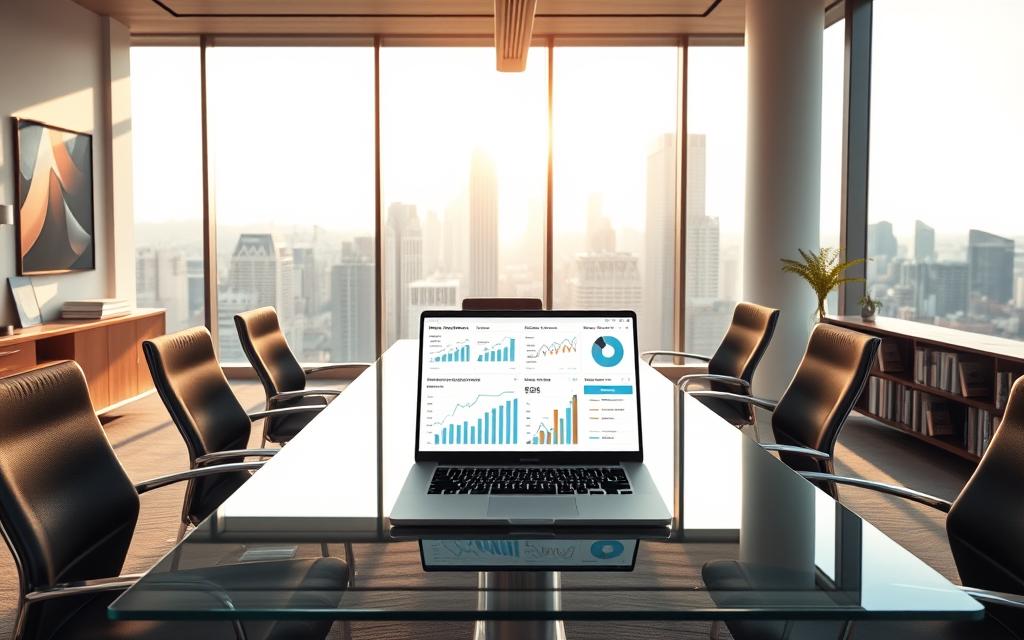Advertisement
Did you know that choosing to rent or buy a home in 2025 might be influenced by big changes in real estate trends? The housing market is always changing. Knowing the latest housing market forecast is key to making a smart choice.
The housing market forecast shows that future homeowners need to think carefully. The old rules might not work anymore. You should look at money matters, lifestyle, and your future plans.
This article will help you understand the important things to think about. We’ll talk about whether renting or buying a home in 2025 is better for you.
Understanding the Current Real Estate Market in 2025
Knowing the real estate market trends in 2025 is key for smart decisions. The market is shaped by many things like the economy, interest rates, and where people want to live.
Key Trends Influencing Home Buying and Renting
Several trends are changing the real estate market in 2025. Housing affordability trends are a big worry, with high prices making it hard for buyers. Also, property investment strategies are now focusing more on green and sustainable homes.
More people want to live in cities, leading to higher demand for city rentals. This has made city rents go up.
Impact of Interest Rates on Home Purchases
Interest rates are very important for home affordability in 2025. Higher rates make borrowing more expensive, which can keep some buyers out.
| Interest Rate | Monthly Mortgage Payment | Total Interest Paid |
|---|---|---|
| 4% | $955 | $143,739 |
| 5% | $1,073 | $186,512 |
| 6% | $1,199 | $231,676 |
Regional Variations in the Housing Market
The housing market in 2025 varies by region. Some places are growing fast because of jobs and new projects. Others are struggling due to economic issues.
For example, tech hubs are attracting more people, boosting housing demand. But areas with fading industries see less demand for homes.
Financial Considerations: Rent or Buy in 2025?
Understanding the financial side of renting versus buying a home in 2025 is key. It’s not just about the immediate costs. It’s about planning for the future and financial stability.
Cost Analysis: Renting vs Buying
First, you need to do a cost analysis. This means looking at monthly payments and other costs. Renters might pay for renter’s insurance and face higher rent later. Buyers have mortgage interest, property taxes, insurance, and maintenance to consider.
A rent vs buy calculator can help. It shows the financial impact of each choice based on today’s market.
- Renting Costs:
- Monthly rent
- Renter’s insurance
- Potential rent increases
- Buying Costs:
- Mortgage payments
- Property taxes
- Homeowners insurance
- Maintenance and repairs
Long-term Financial Implications of Each Option
Renting is flexible and might cost less upfront. But, it might not offer long-term benefits. Buying a home is a big investment that can build equity. Yet, it also means a big part of your wealth is tied up in one asset.
A home buying guide points out the long-term benefits. These include equity buildup and tax deductions on mortgage interest and property taxes.
“Homeownership is a key part of the American dream, but it’s essential to understand the financial commitments involved.”
Hidden Costs of Homeownership
There are hidden costs to buying a home. These include:
- Maintenance and repair costs, which can add up over time.
- Homeowners association (HOA) fees, which increase monthly expenses.
- Property taxes, which can go up and affect your budget.
Doing a rental market analysis helps. It lets you understand local real estate better. This way, you can make a more informed choice.
Lifestyle Factors: Rent or Buy?
Choosing between renting or buying a home is more than just money. It’s about what you value and your personal life. Think about how your lifestyle affects your decision.
Flexibility: Renting vs Stability: Buying
Renting lets you move easily for work or personal reasons. You don’t have to sell a property. Buying a home, though, gives you stability and a place to stay for a long time. This is good for those who want to settle in a community.
| Lifestyle Factor | Renting | Buying |
|---|---|---|
| Flexibility | High – Easier to move | Low – More challenging to relocate |
| Stability | Low – Lease limitations | High – Long-term control |
Lifestyle Changes That May Affect Your Decision
Big life changes, like having a family or retiring, can change what you need in a home. Families might need more room, while retirees might prefer smaller homes.
If you’re expecting big changes, renting might be better. It offers flexibility. But, if you want stability and a long-term investment, buying is the way to go.
The Benefits of Renting in Today’s Market
Renting has become a popular choice for many. It offers flexibility and affordability in today’s housing market. Renting is now seen as a good option for many.
Lower Upfront Costs and Maintenance Responsibilities
Renting means lower upfront costs compared to buying a home. Renters usually pay a security deposit and the first month’s rent. This is often less than the down payment for a mortgage. Plus, renters don’t have to worry about maintenance and repair costs.
Key savings for renters include:
- No down payment
- Lower upfront costs
- No maintenance or repair expenses
A recent rental market analysis shows big savings for renters. This allows them to use their money more wisely.

Access to Amenities and Urban Locations
Renting gives you access to amenities and urban locations that might be too expensive to buy. Many rentals offer pools, gyms, and community spaces. These add to the quality of your life.
“Renting allows you to live in desirable urban locations with access to public transportation, restaurants, and cultural events, which can significantly improve your quality of life.”
Urban locations are great for those who love convenience and a lively community. Renting in these areas offers a more exciting life than suburban or rural areas.
| Amenity | Percentage of Rental Properties Offering |
|---|---|
| Swimming Pool | 40% |
| Gym | 60% |
| Community Space | 55% |
Opportunity to Invest Elsewhere
Choosing to rent lets you invest in other assets. These might give you higher returns than the equity in a home. This is good for those interested in property investment strategies or other investments.
Renting makes it easier to manage your finances. It lets you diversify your investments. This can make your financial strategy stronger, as you’re not tied to one asset.
For example, investing in stocks, bonds, or REITs might give you better returns than a home. This is because a home’s value grows slowly over time.
The Advantages of Buying a Home in 2025
Buying a home in 2025 might be a smart move, thanks to the housing market’s forecast. Homeownership can greatly impact your finances and personal life.
Building Equity and Long-term Financial Security
Buying a home lets you build equity over time. As you pay down your mortgage, you gain wealth. Building equity brings financial security and opens doors for future loans or home improvements.
Personalization and Control Over Your Space
Homeownership means you can make your space your own. You can renovate, add features, or change colors to suit your style. This control is a big plus over renting, where you can’t make as many changes.
Potential Tax Benefits of Homeownership
Homeownership can also save you money on taxes. You might be able to deduct mortgage interest and property taxes. Always talk to a tax expert to understand how this applies to you.
Thinking about these benefits can help you decide if buying a home in 2025 is right for you. It’s part of a home buying guide to help you understand the housing market.
Risk Factors in Renting and Buying
The real estate market is always changing. This means renters and buyers face different challenges. These challenges can affect your money and lifestyle.
Market Volatility and Economic Uncertainty
The real estate market changes due to the economy, interest rates, and government policies. Economic uncertainty can cause market volatility. This affects both rentals and homes.
For example, changes in interest rates can make mortgages more or less appealing. Economic downturns can also lower housing demand and prices.
Analysis of Long-term Rental Market Stability
The rental market’s stability depends on population growth, urbanization, and the economy. Long-term rental agreements offer stability for renters. But, landlords face risks from rent control policies and tenant turnover.
Investing in rentals can be profitable. But, it’s important to understand local market trends and laws to avoid risks.
Homeownership Risks: Maintenance and Market Changes
Buying a home comes with big responsibilities. This includes maintenance costs and the risk of market changes. Maintenance costs can be unpredictable and may hurt your finances. Market changes can also affect your property’s value.
For instance, areas at risk for natural disasters may have higher insurance costs. Changes in local development plans can also impact property values.
Alternative Housing Options to Consider
There are new ways to live beyond renting and buying homes. These options offer unique benefits and chances for everyone. They fit well with today’s property investment strategies and housing affordability trends.
Co-living and Short-term Rentals
Co-living spaces are becoming popular, attracting young people and professionals. They offer a community feel, flexibility, and amenities like gyms. Short-term rentals, like those on Airbnb, are great for temporary needs.
Tiny Homes and Eco-friendly Living
The tiny home trend is growing, driven by affordability and environmental concerns. Tiny homes are cheap and encourage a simple lifestyle. They also help the planet by using less energy and materials.
Understanding Real Estate Investment Trusts (REITs)
For those into property investment strategies, REITs are a good option. They let you invest in real estate without managing properties. REITs offer a chance for passive income and market exposure.
As the housing market changes, exploring these alternatives is key. Whether you want to rent, buy, or invest, knowing your options helps. It ensures your choices match your financial and lifestyle goals.
Tips for Making the Right Decision in 2025
Choosing between renting and buying a home in 2025 is complex. You need to look at your finances, understand the market, and get expert advice.
Assessing Your Financial Health and Goals
First, check your financial health. Look at your income, savings, debts, and credit score. A rent vs buy calculator can help see which option is better for you.
Think about your long-term goals too. A home buying guide can help you understand the costs and benefits of owning a home. This includes mortgage options and tax advantages.
| Financial Factor | Renting | Buying |
|---|---|---|
| Upfront Costs | Security deposit | Down payment, closing costs |
| Monthly Expenses | Rent, utilities | Mortgage, insurance, maintenance |
| Long-term Benefits | Flexibility, lower maintenance | Building equity, tax benefits |
Considering Future Market Trends
Knowing the future market trends is key. Interest rates, housing demand, and the economy can change the market. Keep up with these trends to make the right choice.
- Watch interest rates to find the best time to get a mortgage.
- Look at local housing trends to understand supply and demand.
- Check economic forecasts to see how the market is doing.
The Importance of a Real Estate Professional
Talking to a real estate expert is very helpful. They can give you advice on the market, help with negotiations, and make sure you follow the law.
They can also guide you through the home buying process. From getting pre-approved to closing, their knowledge is priceless.
Conclusion: Making an Informed Choice Between Renting and Buying
Choosing between renting or buying a home in 2025 involves many factors. These include your financial situation, lifestyle, and the state of the real estate market. It’s important to understand these elements well to make a smart choice.
Key Considerations
When deciding, think about your financial health and the future of the housing market. Also, consider the pros and cons of renting versus buying. The real estate market is changing, with different areas and interest rates affecting home sales.
Future Outlook
The housing market is expected to grow, thanks to changes in demographics and the economy. Keeping up with these trends can help you decide better about your housing needs.
In the end, whether renting or buying is best for you depends on your personal situation and goals. By carefully weighing the points discussed here, you can choose what’s right for you financially and personally.



